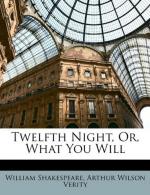|
This section contains 8,146 words (approx. 28 pages at 300 words per page) |

|
SOURCE: “The Dramaturgy of the Ending of Twelfth Night,” in Twelfth Night: Critical Essays, edited by Stanley Wells, Garland Publishing, Inc., 1986, pp. 279-302.
In the essay below, originally published in 1974, Hasler analyzes the influence of Shakespeare's earlier comedies on the last scene of Twelfth Night.
The final resolution of Twelfth Night evolves from a process which engages the whole of the play's last scene. Furthermore, there is no lack of consistent theatrical notation in this scene. Employed with remarkable singleness of purpose, it is instrumental in shaping the build-up towards the strong impact of Viola's revelation. Apart from the unusually extensive control of the action, a study of this ending also invites us to glance back at some features of earlier comedies. The view of Twelfth Night as the consummation of Shakespearian comedy is widely accepted.1 At the same time, few commentators neglect to mention the extent to...
|
This section contains 8,146 words (approx. 28 pages at 300 words per page) |

|


